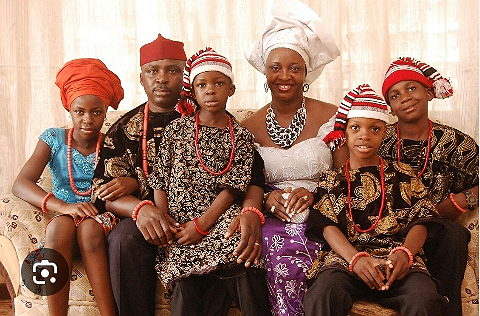"HISTORY OF IGBO CULTURE IN NIGERIA".
Igbo culture in Nigeria has ancient roots, with evidence of habitation in their homeland since at least 4500 BC, marked by sophisticated iron and bronze working by 900 AD, as seen at Igbo-Ukwu. The Nri Kingdom heavily influenced the culture from the 10th century. European contact began in the 15th century, leading to involvement in the slave trade. The British colonized the region, leading to amalgamation into Nigeria in 1914 and imposing taxes. The 20th century saw the development of key societal institutions like councils of elders and age groups, followed by the devastating Nigerian Civil War, which fostered a sense of shared identity and resilience in the face of adversity.
Ancient Roots & Early Development
Deep History:
Igbo culture is ancient, with archaeological evidence suggesting habitation in the region for thousands of years, including artifacts from the Stone Age.
Bronze and Iron Age:
By the 9th century AD, the Igbo were known for their advanced metalworking, evidenced by archaeological sites like Igbo-Ukwu, which yielded intricate bronze sculptures and other precious items.
Nri Kingdom Influence:
The Nri Kingdom, which emerged around the 10th century, played a significant role in the cultural and political development of the region, influencing Igbo society through trade and the establishment of key social structures.
Colonial Era & Its Impact
European Contact:
Igbo people first encountered Europeans (Portuguese) in the 15th century, which eventually led to their extensive involvement in the transatlantic slave trade.
British Colonization:
The British formally established control over the area in the late 19th century, a process made easier by the decentralized nature of Igbo political organization.
Amalgamation & Taxation:
In 1914, the Northern and Southern Protectorates were amalgamated into Nigeria, and by 1928, Igbo men were subjected to taxes for the first time in their history under British rule.
Key Societal Structures
Decentralized Governance:
Igbo society was characterized by a decentralized political organization, with power residing in local communities.
Institutions:
Important institutions included the Council of Elders, age groups (e.g., Agbo), women's associations (like the Omu Society), and councils of chiefs, which maintained traditions and managed justice.
Later History & Modern Identity
The Nigerian-Biafran War:
The late 1960s saw the Nigerian Civil War, as the Igbo region attempted to secede as the Republic of Biafra. This conflict resulted in widespread devastation and suffering but also fostered a strong sense of shared identity among the Igbo people.
Post-War Challenges:
The war had long-lasting impacts, including severe destruction of infrastructure and economic hardship, with many Igbo facing discrimination and difficulty finding employment in the aftermath.
Resilience and Rebuilding:
Despite these challenges, the Igbo people rebuilt their communities and re-established economic and political roles, with the rise of the petroleum industry contributing to the prosperity of southern Nigeria.
Igbo culture in Nigeria has ancient roots, with evidence of habitation in their homeland since at least 4500 BC, marked by sophisticated iron and bronze working by 900 AD, as seen at Igbo-Ukwu. The Nri Kingdom heavily influenced the culture from the 10th century. European contact began in the 15th century, leading to involvement in the slave trade. The British colonized the region, leading to amalgamation into Nigeria in 1914 and imposing taxes. The 20th century saw the development of key societal institutions like councils of elders and age groups, followed by the devastating Nigerian Civil War, which fostered a sense of shared identity and resilience in the face of adversity.
Ancient Roots & Early Development
Deep History:
Igbo culture is ancient, with archaeological evidence suggesting habitation in the region for thousands of years, including artifacts from the Stone Age.
Bronze and Iron Age:
By the 9th century AD, the Igbo were known for their advanced metalworking, evidenced by archaeological sites like Igbo-Ukwu, which yielded intricate bronze sculptures and other precious items.
Nri Kingdom Influence:
The Nri Kingdom, which emerged around the 10th century, played a significant role in the cultural and political development of the region, influencing Igbo society through trade and the establishment of key social structures.
Colonial Era & Its Impact
European Contact:
Igbo people first encountered Europeans (Portuguese) in the 15th century, which eventually led to their extensive involvement in the transatlantic slave trade.
British Colonization:
The British formally established control over the area in the late 19th century, a process made easier by the decentralized nature of Igbo political organization.
Amalgamation & Taxation:
In 1914, the Northern and Southern Protectorates were amalgamated into Nigeria, and by 1928, Igbo men were subjected to taxes for the first time in their history under British rule.
Key Societal Structures
Decentralized Governance:
Igbo society was characterized by a decentralized political organization, with power residing in local communities.
Institutions:
Important institutions included the Council of Elders, age groups (e.g., Agbo), women's associations (like the Omu Society), and councils of chiefs, which maintained traditions and managed justice.
Later History & Modern Identity
The Nigerian-Biafran War:
The late 1960s saw the Nigerian Civil War, as the Igbo region attempted to secede as the Republic of Biafra. This conflict resulted in widespread devastation and suffering but also fostered a strong sense of shared identity among the Igbo people.
Post-War Challenges:
The war had long-lasting impacts, including severe destruction of infrastructure and economic hardship, with many Igbo facing discrimination and difficulty finding employment in the aftermath.
Resilience and Rebuilding:
Despite these challenges, the Igbo people rebuilt their communities and re-established economic and political roles, with the rise of the petroleum industry contributing to the prosperity of southern Nigeria.
Topic Live















